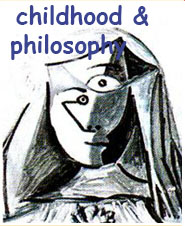the experientiality as a response to the analytical tendency of philosophy for children
DOI:
https://doi.org/10.12957/childphilo.2016.23032Abstract
Sessions of Philosophy for Children has been based in many authors (as Oscar Brenifier) in analytical and conceptual patterns. Even when they have been devoted to study affective and emotional topics, methodologies implemented in the classroom are grounded in those patterns; so that, its main tools are the use of arguments, the creation of definitions, the design of descriptions, the conceptual analysis, the confrontation of thesis and the building of new theories or ideational structures, among others. This is due to the type of rationality on which rests a lot of theories of Philosophy for Children: a philosophy understood as argumentative process that establishes and critic thesis and that structures analytically the reality. In spite of this approach, 20th and 21st century have brought other forms of philosophy: the Ortega y Gasset’s vital and narrative reason, the María Zambrano’s poetic reason, the sartrian dramatic reason, the mystical sounds founded at the works by of Heidegger and the Gadamerian and Benjaminian ontologicalaesthetic reason, among others. Some authors have proposed aesthetic approaches in philosophy for children, for example Kohan and Waksman have work with artistic objects in sessions and Sátiro has worked by through of translating plastic to oral language and the opposite. However, it is urgent to reflect on a form of philosophy for children whose focus is not exclusively reflection on new materials but to perform with new material. It would create a thought beyond the traditional analytical ways: understanding will be not just a critical action but a way of thinking without words. This paper proposes an approach to Philosophy for Children from one of those rationalities: life experience or experienciality.Downloads
Download data is not yet available.
Downloads
Published
2016-08-19
How to Cite
BARRIENTOS-RASTROJO, José. the experientiality as a response to the analytical tendency of philosophy for children. childhood & philosophy, Rio de Janeiro, v. 12, n. 25, p. 519–542, 2016. DOI: 10.12957/childphilo.2016.23032. Disponível em: https://www.e-publicacoes.uerj.br/childhood/article/view/23032. Acesso em: 17 jul. 2025.
Issue
Section
articles




